It is usual for brakes to make a slight squealing or squeaking noise when they are first used after a period of not being used, such as first thing in the morning. This is often caused by a thin layer of rust forming on the brake rotors, which quickly wears off after a few brake applications.
However, if the noise continues after the initial application or is particularly loud, it may indicate that your brake pads are worn and need to be replaced.
A few products on the market are designed to be sprayed on brakes to reduce or eliminate squealing. These sprays typically contain a lubricant that can help to reduce friction and noise between the brake pads and the rotors.
However, using a brake spray is only a temporary solution and will not address the underlying issue causing the noise.
Using a brake spray may temporarily reduce the noise, but it will not fix the problem and could cause other issues if not used properly. It is always best to have a professional diagnose and repair any issues with your brakes.
If your brakes are making a squealing or squeaking noise, I recommend having a mechanic inspect your brakes to determine the cause of the noise and recommend any necessary repairs.
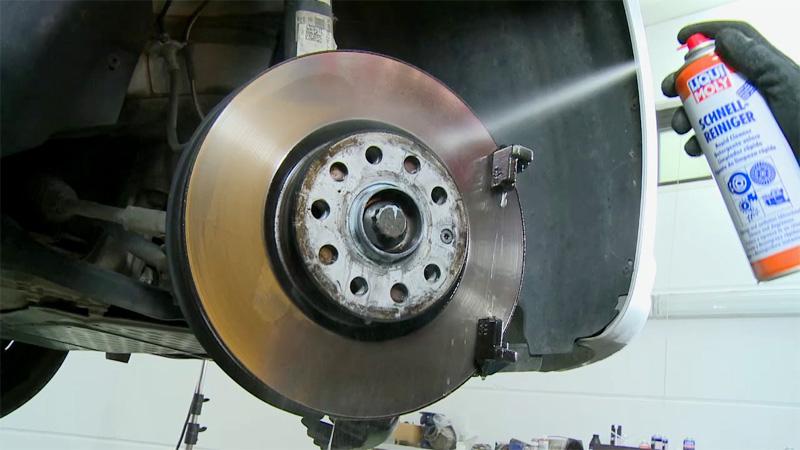
Contents
Should I Spray Anything On My Brakes To Make Them Stop Squeaking?
Brakes squeal when the brake pads are worn down or when there is a buildup of debris or rust on the brake rotors. In either case, spraying something on the brakes will not fix the problem and can make it worse.
Avoid spraying anything on the brakes. Using copper grease on the reverse of brake pads, disassemble brakes, clean, and reassemble. Your brake disks are likely distorted if the squeaking persists. Put up with squeaking brake disks or replace them.
When brake components are disassembled, brake cleaner can be used to clean them, but the primary method for removing brake pads and cleaning them can solve brake squeals.
Make sure no copper grease gets on the discs or rotors by coating the “metal” surface of the pads with copper grease. In addition to cleaning the area where the pads contact the disc/rotor, do not apply grease there.
The pad retaining pins should also be cleaned, but no grease should be applied. If the squealing persists, it is possible that the material of the pads is to blame.
In many cases, brake pads were replaced with substitutes that made brakes squeal really badly. If that is the case, replacing the pads with a new set from an established manufacturer like Ferodo or Montez may be necessary.
What Can I Spray On My Brakes To Stop Squeaking?
When the braking mechanism hardware is faulty, brake squeaks are normal. In addition to rotors, pads, pitons, and clips, brakes also have other components. Corrosion and weary or greasy parts are common problems with these parts.
Brake squeaks can occur for a variety of reasons. The solutions to these problems are also available.
Brake Cleaner
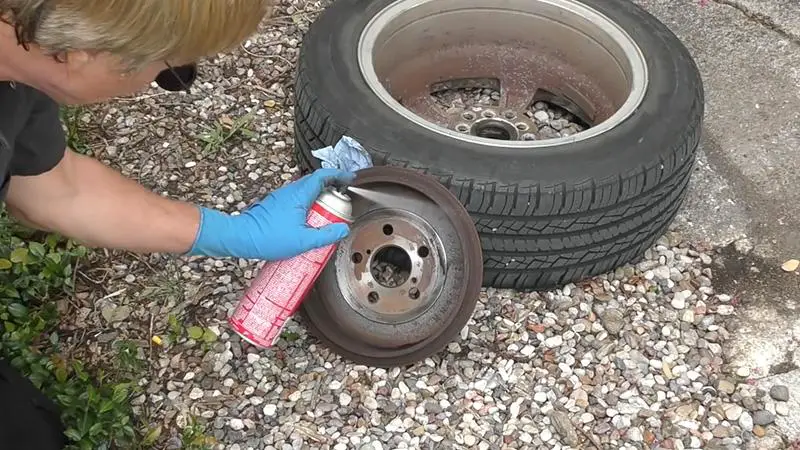
It may help spray bike cleaners on brake parts for a short time to stop squeaking. It is only for cleaning brake parts that these sprays are intended. Grease is not present in them. No residue is left on the brakes after they dry in an instant.
Contact Point Greasers
Taking proper care when greasing brake parts is essential. Applying the brakes contacts the brake pads and rotor. Ensure that these surfaces are not sprayed with greasers. As a result, the car will slide instead of stopping.
Greasers are used for shims and pads that make contact with one another. For proper operation of these parts, grease the jointing points.
Degreasers
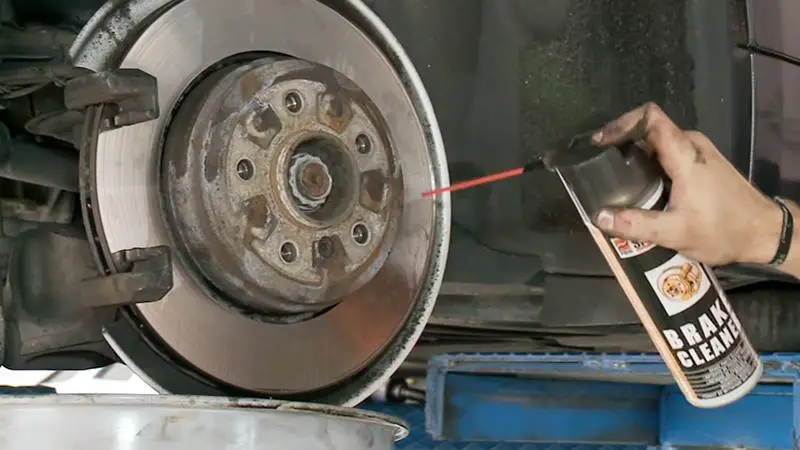
By cleaning the brake’s greasy components, degreasers protect it from breaking down. Using degreasers allows pads to collide with rotors with ease. A grease-removing agent removes dirt and other materials that have built up grease. Using it prevents squeaking noises from coming from the brakes.
Why Do My Brakes Squeak?
There are many reasons why your brakes may squeak. The best-case scenario is that recent rain or snow has caused surface rust to develop on your rotors, and your pads are gradually scraping them away.
The rotor surface may corrode if moisture has built up on the rotor surface as a result of recent humid weather. Dirt particles might accumulate on unpaved roads until the brake pads wipe them away if you drive on them.
It doesn’t matter which scenario you’re in; if the squeaking stops after a few pedal presses, you’re good to go. It may indicate that something more serious is going on if the brake squeaking persists.
There is a possibility that a built-in wear indicator on your brake pads is causing a continuous squeak while you are driving.
Wear and tear on brake pads causes a small tab to scratch the rotor, alerting you that it’s time to change them. It’s important to remember that not all brake pads are created equally, and some wear indicators might only squeak when the brakes are applied.
The brake pads may not make optimal contact with the rotor when stopping due to uneven rotor wear. There was a lot of noise and vibration when braking due to warped rotors, which was unpleasant to drive with.
When you apply the brake pedal, your brake pads may not press flat against the rotors if they wear unevenly. There are times when brake pads are not securely mounted, or shims that hold them in place become loose, causing a squeaky sound.
It’s best to have a mechanic inspect your brakes if you’re unsure of what’s wrong since they play such an important role in your vehicle’s overall performance. An ideal brake system is just one of the things you need on a used car. A vehicle must not only stop well but also be in good condition and last as long as possible.
How To Fix The Squeaky Noise Coming From Your Brakes?
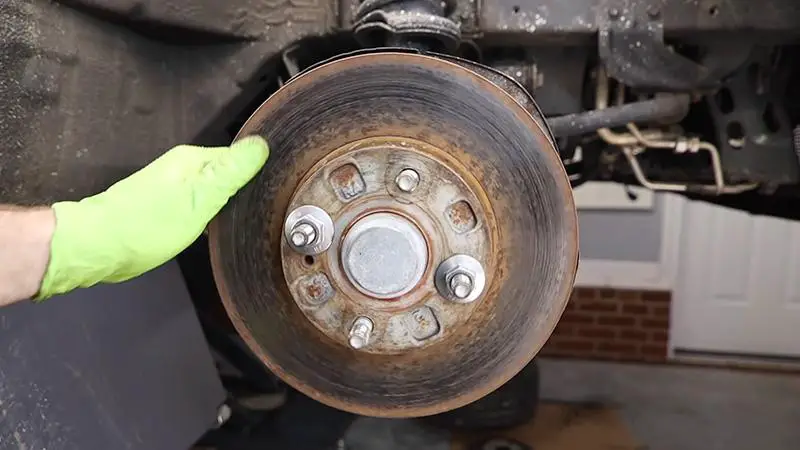
The solution to brake squeaking can be as simple as adjusting the brake pedal or as complex as replacing the brakes.
It may only be necessary to grease the contact points of your brakes if you have a new car or recently installed brakes that squeak. It is first necessary to remove the brake pads from the caliper.
After that, apply lubricant to the back of the pads and various contract points on the caliper carrier. You should avoid getting grease on the rotors or pad surfaces since it can interfere with their performance.
There are times when brake pads vibrate because they are not securely attached. The squealing noise can be eliminated by installing shims, eliminating vibrations. Typically, brake calipers are fitted with rubber bushes to reduce vibrations and ensure that brake pads are tightly fastened.
Last time, you may have used bargain-priced brake pads, which could have caused the squeaking. A mechanic may recommend higher-quality, more expensive metallic pads if you want less noise and better stopping power.
After many miles of regular use, your brake pads and rotors might squeak and need to be replaced. You will likely hear a metal-on-metal grinding sound when you try to stop at this point.
Identifying brake pads or rotors in need of replacement can be easier than other causes of brake squeaking, so visiting a repair facility is a simple decision. If brake pads or rotors have visible grooves or prominent raised lips, they need to be replaced.
Does WD40 Stop Squeaky Brakes?
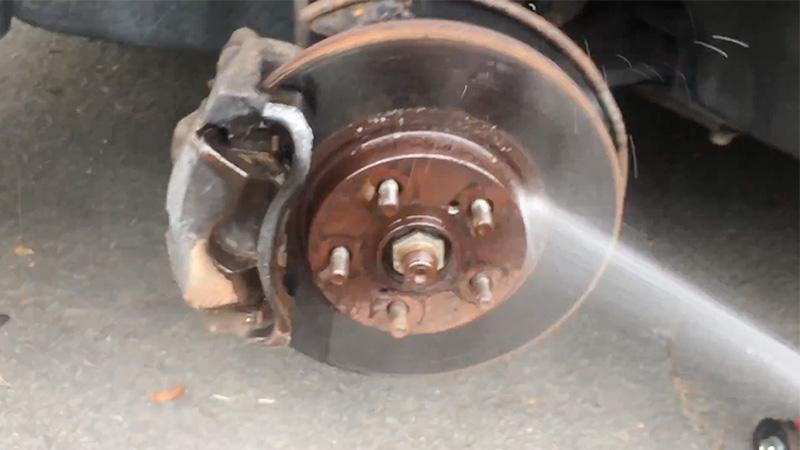
WD40 can’t stop a squeaky brake. There will be less friction between the brake pad surface and the rotor surface. Braking can never be achieved solely through a mechanical mechanism. For temporary use, it may stop the squeaking noise. However, this spray will not solve the problem of squeaky brakes.
There are some lubricating properties to WD40. Your car’s brakes may be left with residues from it. Squeaky brakes cannot be stopped with it. Brakes that squeak need to be properly cared for and identified. Consult a mechanic or professional for help diagnosing the cause of the squeaking.
Whenever your car makes squeaking noises, check the brakes. Avoid these noises by not applying WD40 firsthand. You might be able to stop your car from making noises for some time if you try this. It will, however, wear down the parts over time. If these parts need to be replaced permanently, you will have to do so.
Furthermore, grease from WD40 spray can reach the surfaces between brake pads and rotors. There can be harmful consequences as a result of it. Friction may decrease between these two surfaces as a result. Ultimately, it won’t allow your car to stop when braking.
It is possible to stop brakes from squeaking by using brake cleaner sprays. Dirt specks are removed from brake parts by these sprays. As well, it does not leave behind any residual elements. It takes a short time for them to dry or evaporate. There is no risk involved in using it.
What Happens If You Spray WD40 On Brakes?
A car’s braking mechanism includes many parts, such as rotors, calipers, brake pads, and pistons. WD40 spray has lubricating properties that can lead to more problems in the long run. Stopping brake squeaks is not its purpose.
It is possible to decrease the effectiveness of your brakes by spraying WD40 on them. The rust can cause squeaking brakes in the rotor. It is important to treat this rust properly. For rust removal and cleaning, you need compressed air.
Grease accumulation in the brake rotor can be caused by spraying WD40 in the brake. When this happens, brakes can fail. If you spray WD40 on your brake pads, you might have problems. Basically, it’s an oil. Using oil to clean braking areas or surfaces is never a good idea.
As a result, WD40 may cause the brake calipers to corrode. This spray can cause the piston seal to corrode. As a result of the use of this spray, the dust boot can also swell. You can also experience problems with your car’s acceleration.
Final Words
Brakes can accumulate dirt and rust. Your brakes can squeak due to dust and grease buildup on the road. There are, however, ways to stop your brakes from squeaking by cleaning them.
Cleaning your brakes with bike cleaners and degreasers will stop them from squeaking. It is important to clean the brake parts of the bike to be free of dirt. There is no grease or residue left behind that may cause problems. Unlike lubricants, they do not contain oil.
The use of oily components in brakes is not recommended. Friction may be affected, and the brakes may not work properly. The grease is removed from brake parts with degreasers. No residue is left behind, so they are safe to use.
